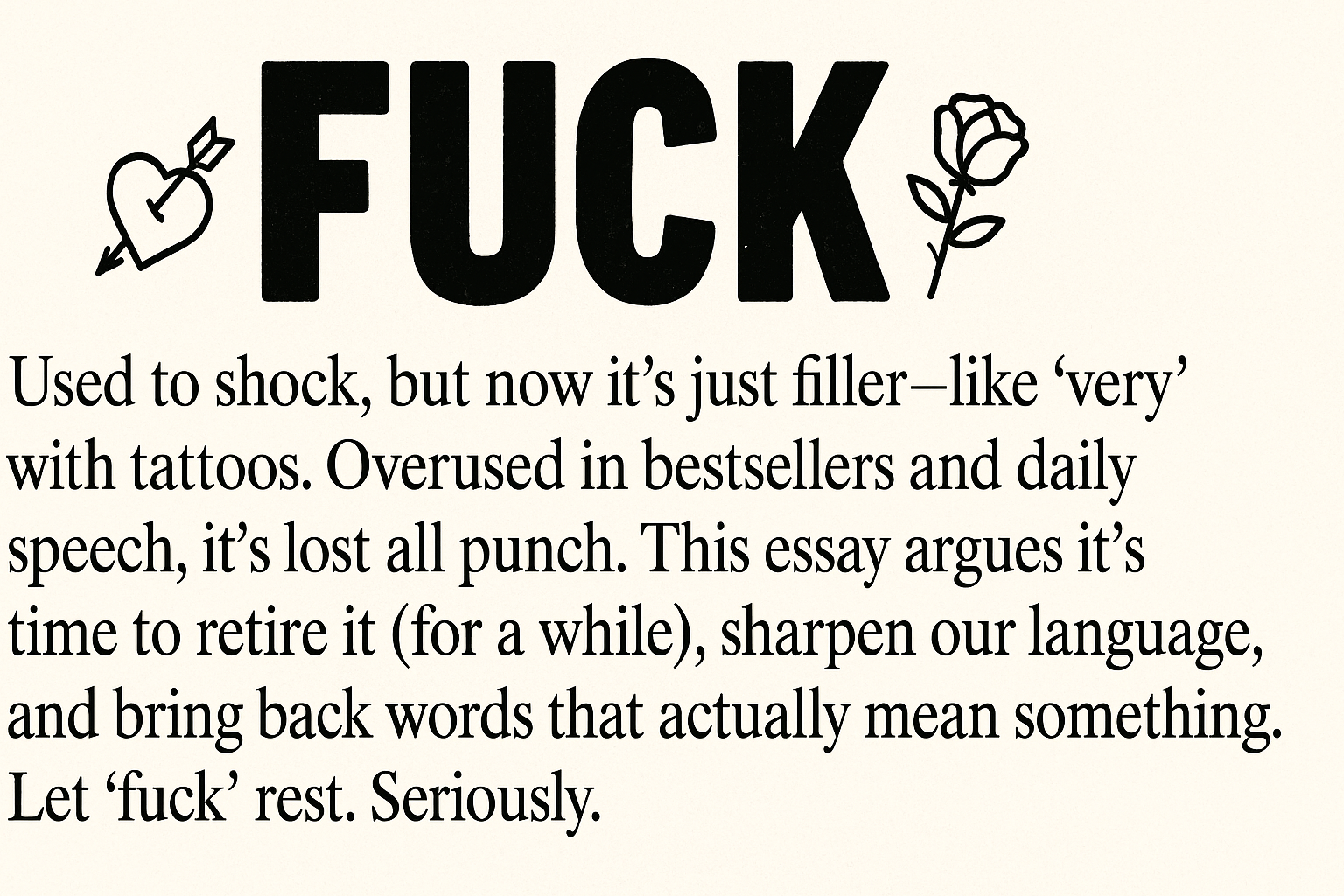
Very Fucking Tired
written by jaron summers (c) 2025
Language like fashion is trendy.
Once, men powdered their wigs and women died of adjectives. Now, our speech is laced with contractions, emojis, and one word in particular that seems to do all the heavy lifting: fuck.
Once a mighty taboo, “fuck” strutted into the English language like a drunk god with a cigar, blowing smoke rings into the face of polite society.
It could shock.
It could sear.
It could melt down a dinner party to a therapy session. But now?
It’s just… tired.
🧠 A Brief History of a Blunt Instrument
“Fuck” is likely Germanic in origin, traced to the likes of fokken, ficken, and other blunt old words that meant things like “to strike” or “to copulate”—and sometimes both, depending on how you were feeling.
The earliest known English use was a 15th-century poem so raunchy it had to pretend it was written in Latin.
For centuries, the word simmered beneath the polite surface of printed English, surfacing occasionally in legal trials, smutty literature, and the more honest moments of naval captains.
Then came the 20th century, and “fuck” burst forth into poetry, politics, and paperback novels, no longer shy about its intentions. It was raw, radical, and revolutionary.
And now?
It’s just routine.
💣 When a Bomb Word Becomes a Comma
We’ve reached peak saturation. “Fuck” has become linguistic wallpaper—always there, rarely noticed. Comedians, screenwriters, memoirists, bloggers, baristas—they’ve all mainlined it. You can now read fuck fifteen times in a single paragraph in a New York Times bestseller, but you won’t flinch. You’ll barely blink.
Once, the word could snap your attention like a mousetrap. Now it’s more like a whoopee cushion with a leak.
Compare it with its equally tired cousin: “very.”
A once-useful intensifier, “very” now mostly tells readers that the writer couldn’t find a better word.
“It was very cold.”
“It was fucking cold.”
Neither tells us how cold. Just that the author was out of metaphors.
At least “very” has the dignity of being mild. “Fuck” still pretends to be powerful. It’s the guy at the party still wearing leather pants, screaming about anarchy while checking his 401(k) on his iPhone.
🧽 Washed Clean by Overuse
Mark Twain said:
“When you catch an adjective, kill it.”
Today he might amend that to:
“When you catch a tired curse word, retire it.”
The cultural overuse of “fuck” has scrubbed it clean of rebellion. Once, it was a dagger. Now it’s a limp spatula. You can use it on any dish, but it rarely adds flavor.
And as with any word used too much, its impact has inverted:
-
Used once with precision, it pierces.
-
Used constantly, it puddles.
Try yelling “FUCK!” in a crowded room today and you’ll probably just be asked to “take it outside” by someone vaping in Crocs.
📚 The New York Times & the Profanity Arms Race
It’s an odd truth: the more a writer uses “fuck,” the more literary they’re assumed to be—at least by modern publishing standards. Some bestselling memoirs seem to believe every page must contain at least one “fuck,” or readers will feel emotionally cheated.
Perhaps we’re all just trying to out-fuck each other.
But if everything is “fucking incredible” or “fucking dark” or “fucking real,” then eventually, nothing is. That’s the trap of lazy intensity.
Even “very” never tried to pretend it was edgy.
✍️ A Modest Proposal
Let’s retire “fuck.” Not forever. Let it sleep. Let it marinate in the silence. Let it regain its punch.
And while we’re at it, let’s be careful with “very,” too. Both words are padding. One pretends to be powerful, the other to be precise. But neither carries weight anymore.
Instead, say what you mean.
-
If you’re cold, say you’re “bone-cold,” “icebitten,” or “shivering like a drunk goat in January.”
-
If you’re mad, be “incandescent,” “feral,” or “flames-on-the-side-of-my-face furious.”
Let’s treat words like tools again. Not ornaments. Not habits. And certainly not crutches with four letters.
In Conclusion:
“Fuck” had its day. It kicked down doors. It rattled church walls. It delighted teenage poets and terrified grandmothers.
But now?
It’s become the linguistic equivalent of air guitar—performative, outdated, and mostly just there to make people think you’re cooler than you are.
And that, dear reader, is very fucking sad.
